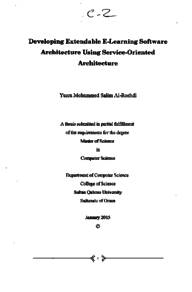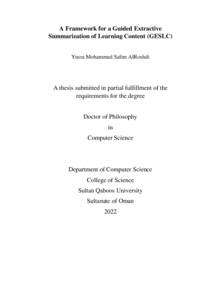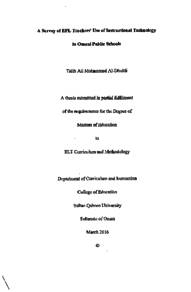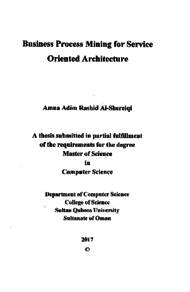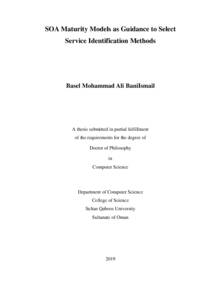Document
Developing extendable e-learning software architecture using service-oriented architecture
Publisher
Sultan Qaboos University
Gregorian
2015
Language
English
English abstract
E-Learning is a growing area that is rapidly developing to keep up with the needs of the education environment. Many researchers are trying to optimize and expand the functionality of the Learning Management System (LMS) such as MOODLE in the field of education in general and in Computer Science Education (CSE) as a special case. Computer Science Education (CSE) is one area that uses the concept of e-Learning to educate and distribute the knowledge to the learners. The main goal of using the online courses in CSE is to almost provide a complete course environment including a virtual lab related to each course if needed. However, the practical software tools that are needed by the Computer Science courses are ignored or simply not considered in most of the LMSs. Therefore, there is an actual need to enhance the Learning Management Systems to be more flexible to integrate the needed software tools. These tools would allow the students to access the entire course environment with the practical aspects of the courses in on-line at any time and from anywhere.
To prepare the needed software tools, the LMS functionality should be extended. This extension could be done by using different ways of integration. The simplest way is to keep the software tools as plugged in through a single page and an URL page tool mechanism to allow users to download the needed tools from the server and use them in the client environment. The second way is to integrate the tools and to build them within the LMS and let users to use those tools in the same environment of the LMS. The third way is to develop and to install the software tools in another environment or connecting to the different tools from other providers. Then by linking the LMS to those tools the students can use them as other available tools of the LMS. The fourth way is to use Service-Oriented Architecture (SOA) to use the software tools that are considered as services and then integrate those tools into the LMS.
This research proposes a solution to overcome the above mentioned limitations regarding the practical sessions for Computer Science Education (CSE). It proposes a solution using web services and Service Oriented Architecture (SOA). This architecture comes to resolve the problem faced in the previous methods and also to satisfy the requirements of the consumers by providing a wide range of services that any developers use. This architecture will be more helpful for Computer Science Education (CSE) as it will help to find the needed services and to integrate them into the LMS. Moreover, it produces a comparison study between different integration approaches of the software tools in LMS. The implementation will be carried out on the Moodle environment since it is an open source e-Learning application and used in the Sultan Qaboos University (SQU).
Member of
Resource URL
Arabic abstract
تطوير نظم التعليم الإلكتروني باستخدام هندسة الخدمات الموجهة يسرا محمد الروشدي الملخص التعليم الإلكتروني هو بيئة حديثة متطورة بشكل متسارع لمواكبة إحتياجات بيئة التعليم فهي تقدم طرق عدة لجمع العلوم والمعارف لتخصص معين في مكان واحد. فهناك العديد من الباحثين يحاولون تطوير وتوسيع وظائف نظم إدارة التعليم الإلكتروني (على سبيل المثال موودل) بشكل عام في مجالات التعليم المختلفة وفي مجال علوم الحاسب الآلي بشكل خاص. وتعتبر علوم الحاسب الآلي واحدة من التخصصات التي تستخدم مفهوم التعليم الإلكتروني لإدارة مصادرها التعليمية وتوزيعها على المتعلمين. وأهم هذه المصادر هي البيئة الإفتراضية لتعليم علوم الحاسب الآلي العملية والتي تحتاج لتوفير أدوات معينة تساهم في ممارسة المهارات العملية للطلاب مثل مختبرات الحاسوب الإفتراضية وغيرها. في المقابل تغيب هذه المصادر عن أنظمة التعليم الإلكتروني لذلك فهي بحاجة لأدوات البرمجيات للتطبيق العملي في أنظمة التعليم الإلكتروني المختلفة. ولذلك هناك حاجة ماسة لتطوير هذه الأنظمة لتكون أكثر مرونة وتحتوي على أدوات تعليمية مختلفة تساهم في تطوير الجانب العملي للطلاب ودمجها في أنظمة التعليم الإلكتروني. هناك العديد من الطرق لإعداد أنظمة التعليم وتهيئتها لدمج الأدوات التعليمية المختلفة عن طريق توسيع مهامها ودراسة جدواها في الربط مع هذه الأدوات. الطريقة الأولى: عن طريق توفير عنوان مورد الأداة المطلوبة في صفحة من صفحات نظام التعليم الإلكتروني ليكون متوفر للمستخدم في الواجهة. لذلك يسهل على المستخدم في هذه الحالة الوصول للأداة المطلوبة وتحميلها على جهازه من النظام مباشرة الطريقة الثانية: عن طريق بناء الأداة المطلوبة في نظام التعليم الإلكتروني بإستخدام نفس اللغة البرمجية والتقنية المستخدمة في النظام التعليمي موويل. هذه الطريقة تسمح للمستخدم بإستخدام الأداة للعمل التطبيقي في نفس بيئة نظام التعليم الإلكتروني. الطريقة الثالثة: عن طريق تطوير الأداة التعليمية على شكل تطبيق إلكتروني مستقل بأي لغة برمجية ثم ربطها بنظام التعليم الإلكتروني عن طريق عنوان موقع الأداة المطلوبة . ستمكن هذه الطريقة المستخدم من استخدام الأداة في بيئة خارج نظام التعليم الإلكتروني. الطريقة الرابعة: تقوم بتطوير الأداة التعليمية بإستخدام تقنية هيكلة النظام بالخدمات الموجهة وربطها بنظام التعليم الإلكتروني عن طريق استخدام الواجهة لهذه الخدمة و صياغتها لتتناسب مع النظام. تأتي هذه الطريقة لحل المشاكل التي تواجهها الطرق السابقة وكذلك لتلبية متطلبات المستخدمين من خلال توفير مجموعة واسعة من الخدمات الحلول المقترحة في هذا البحث تاتي للتغلب على مشكلة عدم توفر الأدوات البرمجية للمحتوى التعليمي لعلوم الحاسب الألي. كذلك يناقش كيفية تعزيز انظمة التعليم الإلكتروني عن طريق توفير الأدوات كخدمات ثم دمجها في النظام. علاوة على ذلك ستكون هناك دراسة مقارنة بين الطريق السابقة بعد تطبيقها في بيئة نظام التعليم الإلكتروني (موودل) لأنه تطبيق مفتوح المصدر ويستخدم في جامعة السلطان قابوس.
Category
Theses and Dissertations

